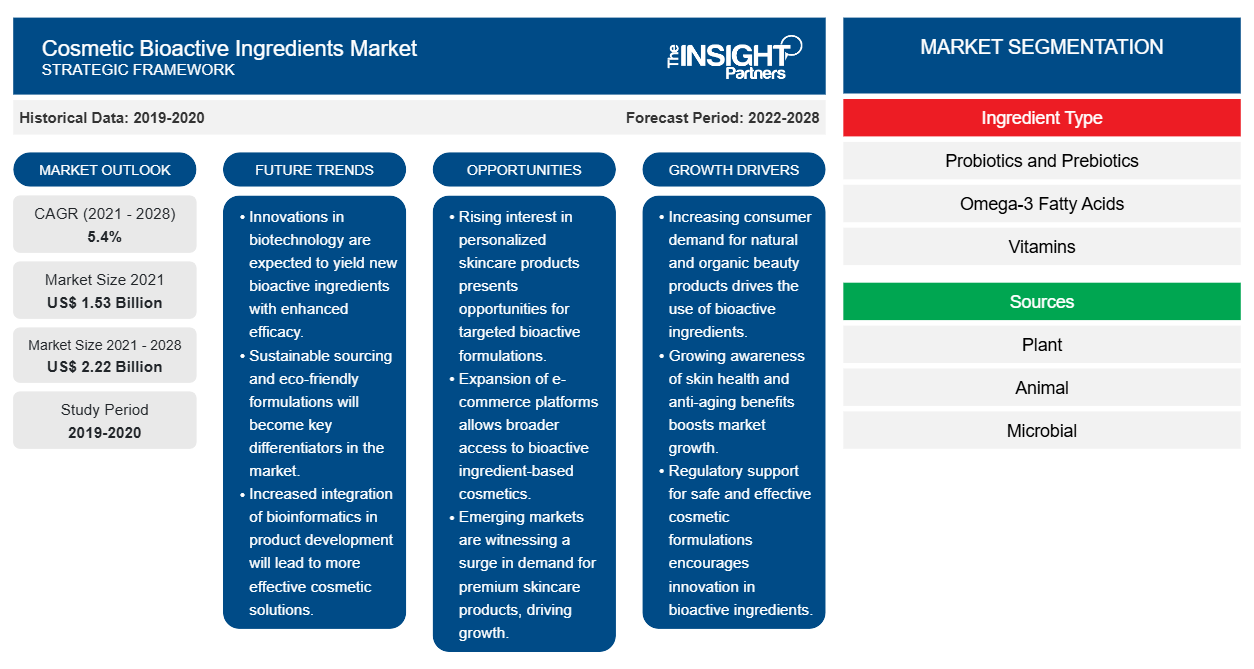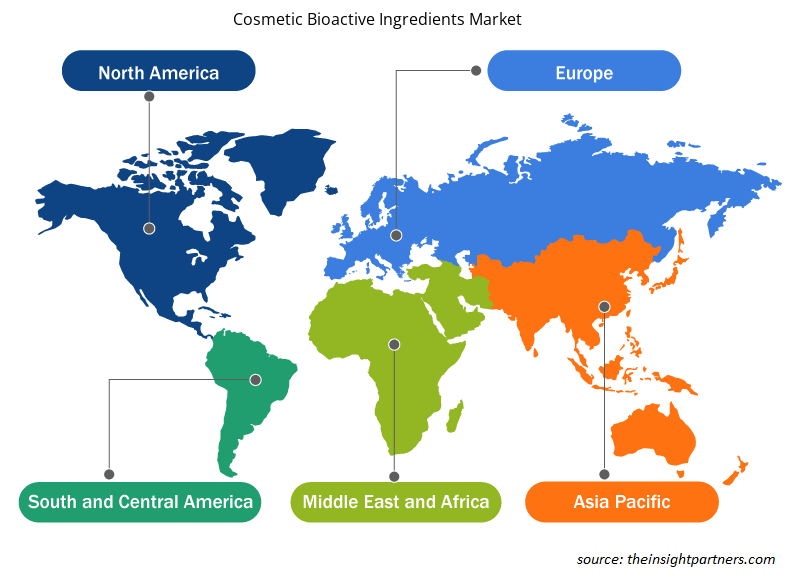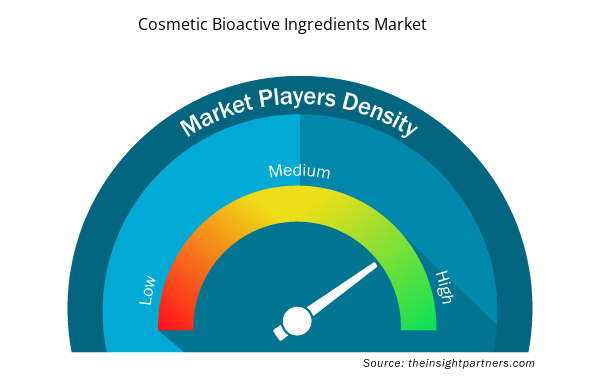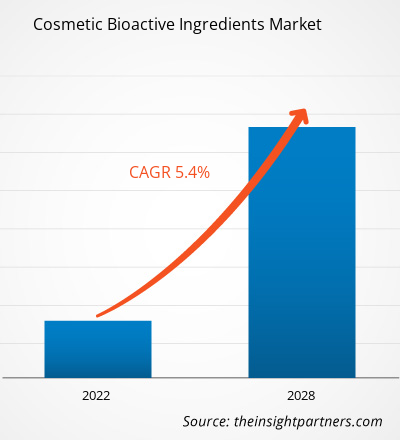The cosmetic bioactive ingredients market is projected to reach US$ 2,215.96 million by 2028 from US$ 1,529.91 million in 2021; it is estimated to grow at a CAGR of 5.4% from 2021 to 2028.
Cosmetics are products made to apply to the skin and hair to cleansing, beautifying, promoting attractiveness, or improving appearance. Amid the active ingredients usually used in this type of preparation, there is a global trend of incorporating vegetable source products due to their commercial appeal, safety, and rich composition, often related with a synergistic or multifunctional effect. Botanical extracts are high in secondary metabolites that exist in plants with high structural diversity. Both flavonoids and non-flavonoids are related to interesting cosmetic properties like photoprotection, anti-aging, moisturizing, antioxidant, astringent, anti-irritant, and antimicrobial activity. With their bioactive components and pharmacologic actions, these bioactive ingredients have been shown to provide dermatologic benefits with potential applications for skin rejuvenation, photoprotection, wound healing, and more. The cosmetic bioactive ingredients market growth is primarily attributed to the rising preference for natural ingredients in cosmetic products and increasing numberof bioactive ingredientsbeing launched. However, stringent regulatory frameworks are restricting the Cosmetic Bioactive Ingredients market growth.
Customize This Report To Suit Your Requirement
You will get customization on any report - free of charge - including parts of this report, or country-level analysis, Excel Data pack, as well as avail great offers and discounts for start-ups & universities
Cosmetic Bioactive Ingredients Market: Strategic Insights

- Get Top Key Market Trends of this report.This FREE sample will include data analysis, ranging from market trends to estimates and forecasts.
Customize This Report To Suit Your Requirement
You will get customization on any report - free of charge - including parts of this report, or country-level analysis, Excel Data pack, as well as avail great offers and discounts for start-ups & universities
Cosmetic Bioactive Ingredients Market: Strategic Insights

- Get Top Key Market Trends of this report.This FREE sample will include data analysis, ranging from market trends to estimates and forecasts.
Market Insights
Increasing consumer demand for natural products is fueling the research related to bioactive substances that can be used in cosmetics. Europe is home to a few of the biggest bioactive ingredient manufacturers and personal care brands, such as BASF and DSM. The launch of bioactive ingredients for the personal care industry is driving the growth of the market. In June 2019, BASF Care Creations launched three new active ingredients for the beauty market, which use rambutan trees that provide skin hydration and rejuvenation. Similarly, in April 2019, Lonza launched the H2OBioEV bioactive ingredient, which is a unique combination of naturally sourced ingredients—Aphanothece Sacrum polysaccharides and Galactoarabinan—with water and glycerin. The ingredient confers moisturization abilities by replenishing essential humectants, which facilitates optimal environment for the formation and maintenance of a strong epidermal protein barrier.
Ingredient Type-Based Insights
Based on ingredient type, the cosmetic bioactive ingredients market is bifurcated into probiotics and prebiotics, omega-3 fatty acids, vitamins, carotenoids and antioxidants, plant extracts, minerals, amino acids, proteins and peptides, and others. The amino acids segment is likely to hold largest share of the market in 2021. However, the plant extracts segment is anticipated to register the highest CAGR in the market during the forecast period.
Source-Based Insights
The cosmetic bioactive ingredients market, by sources, is segmented into plant, animal, and microbial. The plant segment is likely to hold largest share of the market in 2021. However, the microbial segment is anticipated to register the highest CAGR in the market during the forecast period.
Companies operating in the cosmetic bioactive ingredients market are adopting strategies such as product launches, mergers and acquisitions, collaborations, product innovations, and product portfolio to expand their footprint worldwide, maintain brand name, and meet the growing demand from end users.
Cosmetic Bioactive Ingredients Market Regional Insights
The regional trends and factors influencing the Cosmetic Bioactive Ingredients Market throughout the forecast period have been thoroughly explained by the analysts at Insight Partners. This section also discusses Cosmetic Bioactive Ingredients Market segments and geography across North America, Europe, Asia Pacific, Middle East and Africa, and South and Central America.

- Get the Regional Specific Data for Cosmetic Bioactive Ingredients Market
Cosmetic Bioactive Ingredients Market Report Scope
| Report Attribute | Details |
|---|---|
| Market size in 2021 | US$ 1.53 Billion |
| Market Size by 2028 | US$ 2.22 Billion |
| Global CAGR (2021 - 2028) | 5.4% |
| Historical Data | 2019-2020 |
| Forecast period | 2022-2028 |
| Segments Covered |
By Ingredient Type
|
| Regions and Countries Covered | North America
|
| Market leaders and key company profiles |
Cosmetic Bioactive Ingredients Market Players Density: Understanding Its Impact on Business Dynamics
The Cosmetic Bioactive Ingredients Market market is growing rapidly, driven by increasing end-user demand due to factors such as evolving consumer preferences, technological advancements, and greater awareness of the product's benefits. As demand rises, businesses are expanding their offerings, innovating to meet consumer needs, and capitalizing on emerging trends, which further fuels market growth.
Market players density refers to the distribution of firms or companies operating within a particular market or industry. It indicates how many competitors (market players) are present in a given market space relative to its size or total market value.
Major Companies operating in the Cosmetic Bioactive Ingredients Market are:
- Koninklijke DSM N.V.
- Ajinomoto Co., Inc.
- Roquette Freres
- ADM
- BASF SE
Disclaimer: The companies listed above are not ranked in any particular order.

- Get the Cosmetic Bioactive Ingredients Market top key players overview
Cosmetic Bioactive Ingredients Market – by Ingredient Type
- Probiotics and Prebiotics
- Omega-3 Fatty Acids
- Vitamins
- Carotenoids and Antioxidants
- Plant Extracts
- Minerals
- Amino Acids
- Proteins and Peptides
- Others
Cosmetic Bioactive Ingredients Market – by Source
- Plant
- Animal
- Microbial
Cosmetic Bioactive Ingredients Market – by Geography
North America
- US
- Canada
- Mexico
Europe
- France
- Germany
- Italy
- UK
- Spain
- Rest of Europe
Asia Pacific (APAC)
- China
- India
- South Korea
- Japan
- Australia
- Rest of Asia Pacific
Middle East & Africa (MEA)
- South Africa
- Saudi Arabia
- UAE
- Rest of Middle East & Africa
South America (SAM)
- Brazil
- Argentina
- Rest of South and Central America
Company Profiles
- Koninklijke DSM N.V.
- Ajinomoto Co., Inc.
- Roquette Freres
- ADM
- BASF SE
- FMC Corporation
- Vytrus Biotech
- Cargill, Inc.
- Sensient Technologies Corporation
- DUPONT
- Historical Analysis (2 Years), Base Year, Forecast (7 Years) with CAGR
- PEST and SWOT Analysis
- Market Size Value / Volume - Global, Regional, Country
- Industry and Competitive Landscape
- Excel Dataset



Report Coverage
Revenue forecast, Company Analysis, Industry landscape, Growth factors, and Trends

Segment Covered
Ingredient Type, Sources and Geography

Regional Scope
North America, Europe, Asia Pacific, Middle East & Africa, South & Central America

Country Scope
France, Germany, Italy, Spain, United Kingdom
Frequently Asked Questions
Global cosmetic bioactive ingredients market is segmented by region into North America, Europe, Asia Pacific, Middle East & Africa, and South & Central America. In North America, the U.S. is the largest market for cosmetic bioactive ingredients. The growth of the region is attributed to increasing product launches coupled with increasing adoption of cosmetics.
The Europe region is expected to account for the fastest growth in the cosmetic bioactive ingredients market. Technological advancement for extraction of bioactive ingredients in this region contribute to this dominant share. Additionally, rising preference for natural ingredients in cosmetic products are said to be responsible for this growth.
The cosmetic bioactive ingredients market majorly consists of the players such BASF SE, DuPont de Nemours, Inc., FMC CORPORATION, Cargill, Incorporated, Sensient Technologies Corporation, DSM, Ajinomoto Co. Inc., Roquette Frères, ADM, and Vytrus Biotech amongst others.
The plant segment dominated the global cosmetic bioactive ingredients market and accounted for the largest revenue share of 62.50% in 2021.
The amino acids segment dominated the global cosmetic bioactive ingredients market and held the largest revenue share of 20.81% in 2021.
Key factors that are driving the growth of this market is rising preference for natural ingredients in cosmetic products and increasing launch of bioactive ingredients.
Cosmetics are products made to apply to the skin and hair to cleansing, beautifying, promoting attractiveness, or improving appearance. Amid the active ingredients usually used in this type of preparation, there is a global trend of incorporating vegetable source products due to their commercial appeal, safety, and rich composition, often related with a synergistic or multifunctional effect. Botanical extracts are high in secondary metabolites that exist in plants with high structural diversity. Both flavonoids and non-flavonoids are related to interesting cosmetic properties like photoprotection, anti-aging, moisturizing, antioxidant, astringent, anti-irritant, and antimicrobial activity. With their bioactive components and pharmacologic actions, these bioactive ingredients have been shown to provide dermatologic benefits with potential applications for skin rejuvenation, photoprotection, wound healing, and more.
Trends and growth analysis reports related to Chemicals and Materials : READ MORE..
The List of Companies - Cosmetic Bioactive Ingredients Market
- Koninklijke DSM N.V.
- Ajinomoto Co., Inc.
- Roquette Freres
- ADM
- BASF SE
- FMC Corporation
- Vytrus Biotech
- Cargill, Inc.
- Sensient Technologies Corporation
- DUPONT

 Get Free Sample For
Get Free Sample For